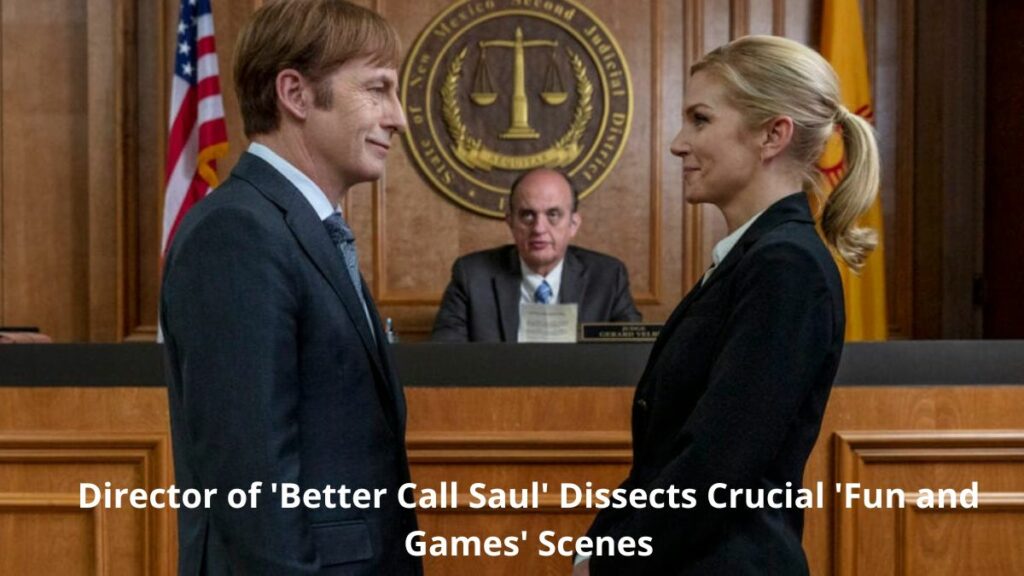Director of ‘Better Call Saul’ Dissects Crucial ‘Fun and Games’ Scenes
In preparation for the series finale on August 15th, AMC’s Better Call Saul has enlisted the services of a bevy of seasoned franchise directors, including Breaking Bad fan favorite Michelle MacLaren and writer-producer-directors Thomas Schnauz, Vince Gilligan, and Peter Gould.
Director Michael Morris has directed several landmark episodes, including the season six premiere, “Wexler vs. Goodman,” “The Guy for This,” and this week’s episode. Like Ann Cherkis’s “The Guy for This,” “Fun and Games” is an essential part of the story.
Must read-
- Jill Zarin Heads Back to ‘Housewives’ After Building Business Empire: ‘it Was Like I Never Left’
- Regarding the Kardashians Having Children Outside of Marriage, Kris Jenner Responds
Better Call Saul Director Dissects ‘Fun and Games’ Scenes
Just how important is it? To be honest, that remains to be seen. After two episodes in a row that saw the deaths of main characters, “Fun and Games” avoided any such tragedy, but it does include pivotal moments for Rhea Seehorn’s Kim, Giancarlo Esposito’s Gus, and Jonathan Banks’ Mike that could serve as series finales.
After enduring a record-breaking heatwave in London, Morris said about the potential breakup between Jimmy and Kim, Gus’ romantic conversation with a mystery man played by Reed Diamond, and what it means to direct scenes that are clearly important without relying too heavily on their significance.

You helmed Season 6’s premiere; did you know then that it would be your last opportunity to direct the show?
The fact is that I knew I was going to another one from the very beginning when we were all figuring out the director roster for the previous season. The fact that Vince Gilligan did a few episodes, Michelle MacLaren returned for one, and Rhea and Giancarlo were also involved made getting the second one feels like a huge honor.
Is there any part of you that read the episode’s events and thought, “Oops, they gave me the series finale by accident!” when you received the script for “Fun and Games?”
My answers will be circumspect because I don’t want to ruin anything for anyone, including you. But I agree with you wholeheartedly, and I kept repeating that this feels like the end. Almost all of the main characters’ arcs feel like they’re coming to a close. Now, I’m not saying this to imply that it is the case; there are still extraordinary episodes to come, and for sure, there will be things that surprise people, but for me, this episode was an elegy for certain things. Mike and Gus’s stories and Jimmy and Kim’s are all very sad in their own ways. Goodbyes and endings bring about a great deal of sadness.
What are the difficulties, from your point of view, of paying tribute to those last possible moments, those elegiac beats, without constantly hammering home the point that this is the climax? You want it to acknowledge the passing of time without making a big deal about it.
It was a major consideration as I planned this one out. So, how do you go about doing that? As we said, the script by Ann Cherkis has an elegiac tone, but it’s also very much a living, breathing thing. One of the things I admire most about Ann as a writer—and one of the reasons I’ve had the good fortune to direct so many of her episodes—is that she approaches her subjects from unexpected angles.
The scene with Gus in the restaurant at the end of what seems to be the end of his story is something I’ve never seen written by anyone else. There’s a scene in which no one is waving flags or blowing horns in honor of Gus Fring’s passing. That’s just a scene. To fully appreciate it, as I believe you must do with the Jimmy and Kim scene, you must be fully present and in the moment.
In an earlier season, I directed a scene written by Thomas Schnauz in which the couple argues passionately in that very room before she asks him to marry her. So, I agree with you that the best way to steer it is to simply focus on the here and now and avoid giving it too much significance. As we near the series’ conclusion, I’d also like to mention that it’s been on my mind to do what I can to respect the show’s legacy. The episode provided us with moments to reflect, which I believe contributed to our collective sense of respect for the series’ conclusion. The elevator lobby scene with the trash can, a scene from Vince’s pilot, and a few other things we said throughout were all deliberate references to the pilot that we hoped the audience would remember near the end of the episode.
I hope you found the information presented above to be of use. You can also look through our news section, where we normally cover all of the most recent news and happenings around the world. Visit our website if you’d like to learn more about this topic.

